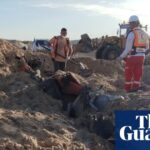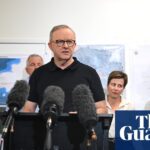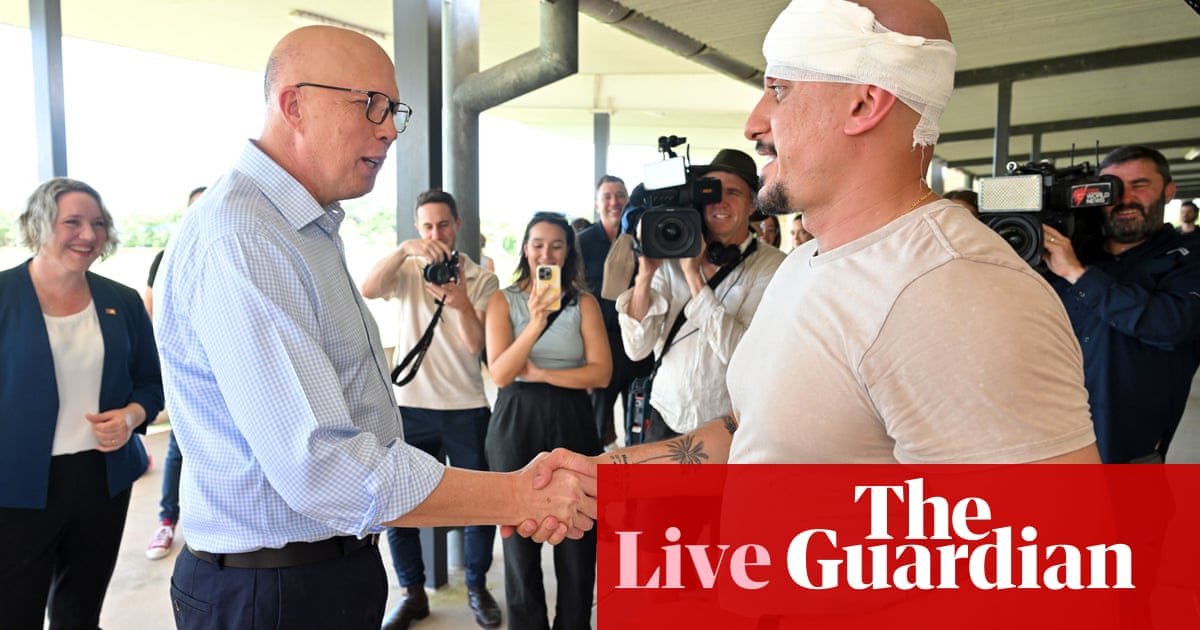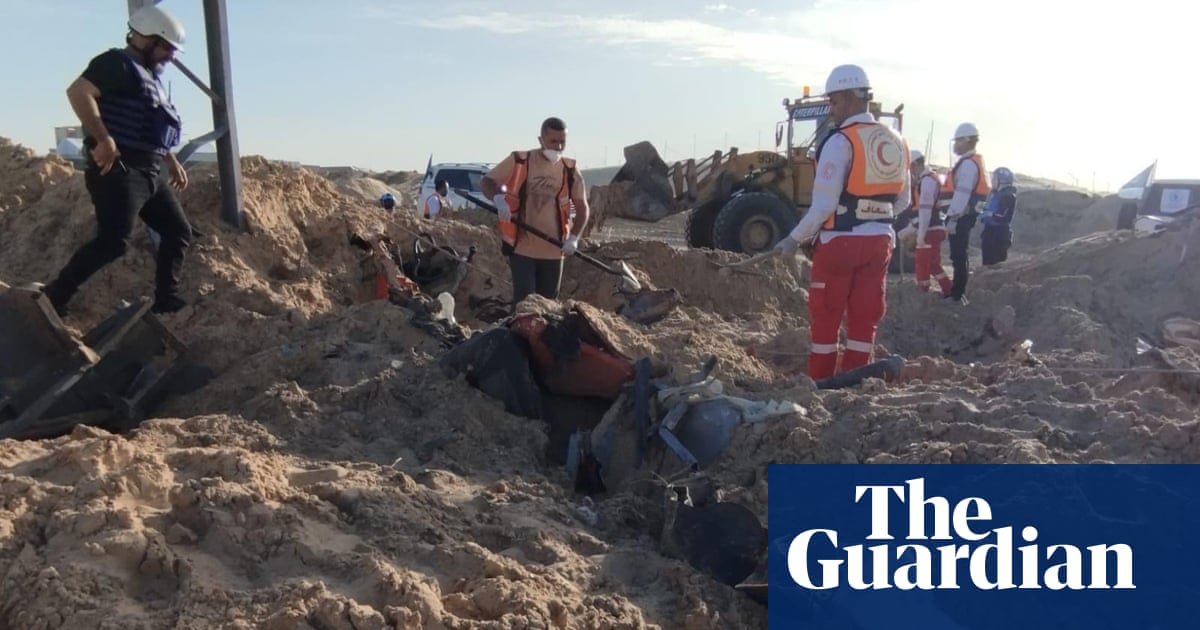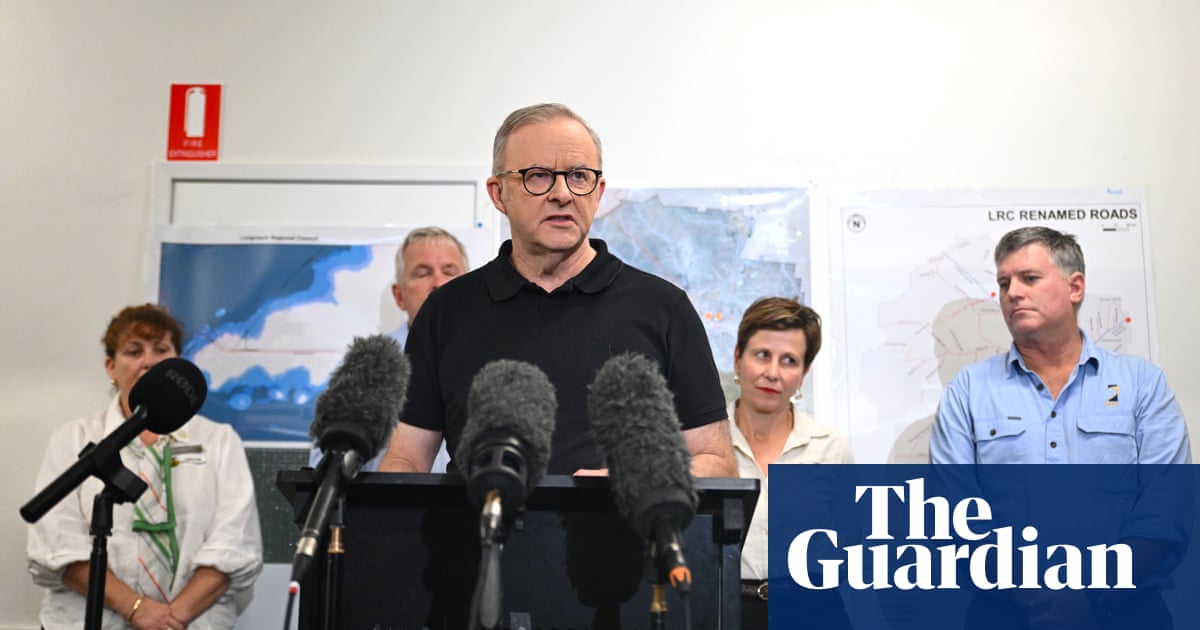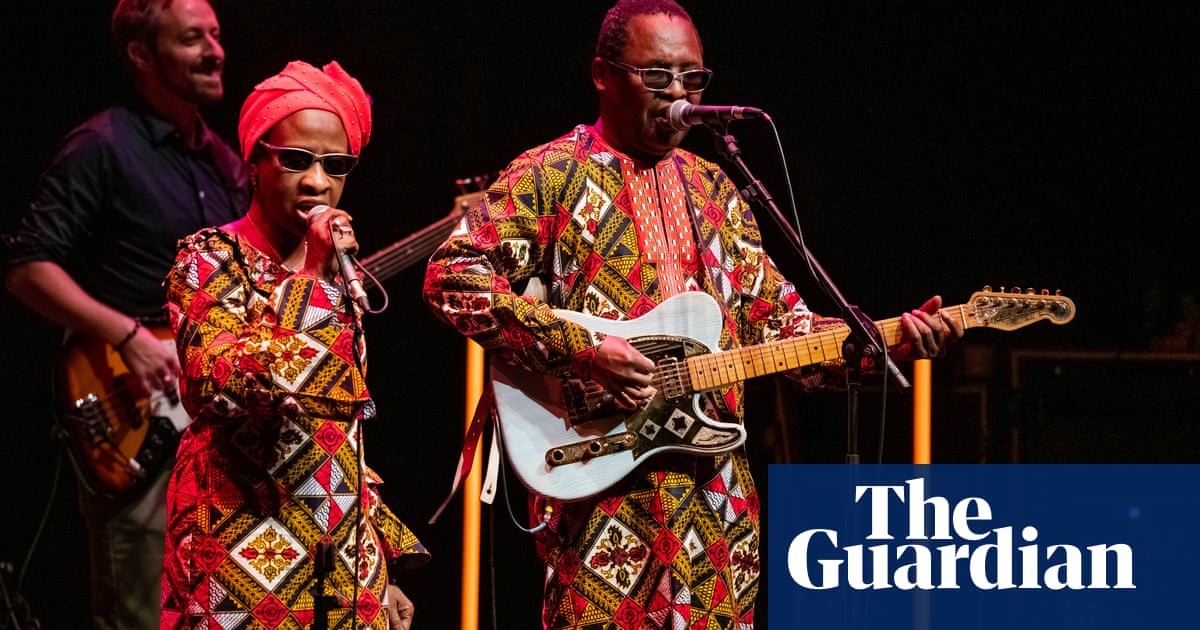Cameraman hurt by Dutton football kick with ‘a bit too much heat on it’
Man down! There has been an injury on the campaign trail in Darwin, outlets are reporting.
According to Andrew Tillett at the Australian Financial Review, Channel 10 camera operator Ghaith Nadir cut his head after a “drop punt” by the opposition leader “had a bit too much heat on it” and struck the man’s camera.
He has been pictured bandaged up and shaking hands with Peter Dutton, who checked to make sure he was OK.


Key events
Time to wind the clocks back
Daylight saving time ends on Sunday at 3am, when clocks move back one hour in New South Wales, Victoria, South Australia, the Australian Capital Territory and Tasmania.
For almost 20 million Australians, the end of daylight saving means an extra hour’s sleep.
For others in border communities, it means clarity on opening hours and reservation times for customers between states.
Read the story here:
‘Confusion and uncertainty’ among public servants over working mandates
Thousands of public servants have been told their employment agreements will not change regardless of who wins the federal election, as a fresh political fight kicked off over potential job cuts, AAP reports.
The employment of 185,000 Australian Public Service workers has been in the spotlight since Peter Dutton pledged to cut 41,000 jobs and push workers to return to the office full-time if elected.
The Coalition has since softened its work from home policy, with Dutton now declaring his strong support for it and pledging to further reduce the number of public servants who may be affected by return to work mandates.
The Community and Public Sector Union said Dutton’s comments on flexible work had caused “confusion and uncertainty” as until now, it was thought all workers would be affected by full-time office requirements.
National secretary Melissa Donnelly said flexible arrangements were why a record number of women worked for the federal public service and could be a deciding factor in someone working or not working.
Still on China, Albanese is asked whether there is any political concern over the level of Chinese ownership in food production.
He says “we welcome foreign investment in Australia where it’s appropriate” but a port has “particular characteristics to it”.
But will forcing China out upset the diplomatic relationship?
“No,” Albanese replies.
My job is to stand up for the Australian national interest. I’ll continue to do that. But I note that our relationships with China and our economic relationship has improved to the point where we have more than $20bn of exports that have returned. That’s about Australian jobs and Australian interests.
Most of our ports and airports are in private hands. The question is – is it in the hands of Australian national interests?
One of the things about superannuation funds which own substantial assets in our ports and our airports … is that superannuation funds mean that all of you who have super accounts own those assets as well, and they get returned to Australians … there’s $3tr of money available. A lot of that, at the moment, is going offshore for infrastructure investment. We want that investing here in Australian infrastructure because that produces a return for Australians as well. Thanks very much.
And so concludes the press conference.
It was rather convenient of the PM to make the announcement on ABC Darwin ahead of Dutton’s visit. Asked why he called the radio station last night, Albanese says “why not?”
I do lots of interviews. I called Triple M yesterday morning, and I called … ABC Sydney yesterday.
Pressed on whether he was told an announcement was coming via a leak, Albanese says “that’s up to you lot to talk amongst yourselves about what happens”.
I can confirm certainly it didn’t come from anyone here … We’ve made an announcement, but there’s more detail to come as we roll out over the next four weeks … There’s nothing spontaneous about this.
We have a political decision that’s been made on the basis of advice … consistent with the position that we’ve had since 2015, that this is an important national economic asset.
Asked if advice has changed over the past two years, he says “the government increasingly understands that we need to increase our economic resilience”.
Does that mean the Chinese interest in the Port of Darwin is a national security threat?
Albanese says “we, as a government, have made a decision about our economic resilience, consistent with a position that I have put since 2015”.
Darwin Port could be subject to compulsory acquisition, says PM
There is some back and forth over a timeline on when the Port of Darwin would be removed from Chinese ownership.
Landbridge has told SBS that the port is not for sale. Are you prepared to use compulsory acquisition powers?
Albanese replies “yes”.
After how long? Why can’t you say the timeframe?
“I’m not putting a timeframe on it,” he continues.
We are a mature government that does things in an orderly way, and we’ll continue to conduct ourselves in that way.
The head of Landbridge told the Financial Review they hadn’t heard from the government. The prime minister’s earlier statement was they have. Who from the government, and on what timeframe?
Albanese says “we have consulted” but won’t go into further details as they’re “commercial issues”.
We have engaged with them. And individual companies have reached out about whether a sale could be got … what we’re saying is that we will, if need be, compulsorily acquire.
He is then asked whether he had conversations with China before his announcement, as Peter Dutton indicated in his press conference when he said the Coalition had contacted the Chinese ambassador.
Well, he’s obviously got better connections with the Chinese ambassador. That’s a very strange thing for him to say. I’ll just leave that sitting there. What we have done is engaged very clearly. I have made – if you go back and look at my transcripts since 2015, you will see multiple statements from me about what our position is.
So how much would it cost taxpayers? Albanese says it’s a commercial position and he won’t engage in speculation.
PM coy over timing for Darwin returning to Australian ownership
OK, but why didn’t he first act upon it when elected more than two years ago?
Albanese says the government established an inquiry after taking office and had been “engaging” with stakeholders.
He says any time he has been asked about the matter since 2015, he has given the same answer.
Asked if Labor could “beat or match” Peter Dutton’s commitment for the port to be returned to Australia in six months, Albanese says that’s just “talking on the run”.
I have seen his media release and his media release pretends this has nothing to do with the commonwealth government of which he was a cabinet minister. And then he was the defence minister during this time as well. He did absolutely nothing. What my government did was have an assessment of these issues but, at the same time, we didn’t wait for that.
We looked for interest, including through superannuation funds. I want this to go into Australian ownership. But I’d prefer it to be Australian ownership under the private sector. But, if need be, we will purchase as well.
Pressed “by when”, he doesn’t answer.
On to the Port of Darwin developments, which Albanese was quick to make on ABC Radio yesterday ahead of the Coalition’s formal announcement to bring it back into Australian hands during a press conference this morning.
Why has it taken an election to make some announcements about this?
Albanese says “it hasn’t”, adding Labor opposed to sale when it was made to the Chinese government under the Coalition in 2015.
That was a direct result of the program introduced by the Abbott government in its 2014 budget of asset recycling, which provided an incentive for state and territory governments to flog off our infrastructure assets.
In this case, in April of 2016, the commonwealth gave the Northern Territory government of the Country Liberal party – $19.5m. A cash bonus for flogging off the Port of Darwin. When we’ve come to office, we have been engaging – including with Landbridge – with superannuation funds. The Northern Territory government have been in consultation with my departments as well in our government. We’ve had Treasury and Finance looking at this as well.
And I foreshadowed on Thursday, as you are aware, a future announcement about the Port of Darwin. We have a clear view, which is that it should be in Australian hands. And Peter Dutton was in the cabinet that sold it.
Asked if he would be open to extending the disaster payments beyond 13 weeks, Albanese says that is the “allowance” under the existing fund.
That is the standard, that is not a new fund, that is something that happens in terms of disaster-relief. We will continue to engage constructively with the Queensland government and local mayors … We will continue to listen to them on the ground as well.
He says it “takes time” for regional infrastructure funding to be rolled out, adding the electorate of Maranoa where he is appearing received the most projects in funding announced in January this year.
What we have done is make sure that we have been responsible. I remind you that we turned a $78bn deficit into a$22bn Labor surplus. We then turned the next year a deficit that was projected to be over $50bn- we turned that into a surplus in excess of $15bn.
And this year, we have almost halved the deficit that was anticipated. So we have been responsible. We’ve improved the budget bottom line by some $207bn. The first government to produce two budget surpluses in a row in two decades.
Albanese points to the “unprecedented impacts” of flooding across the region.
What role do you think climate change is playing, if any, in exacerbating those impacts?
He replies that you can’t say any single extreme weather event is solely related to climate change, but science indicates they will become more frequent and more intense.
You cannot say any extreme weather event any single event is just because of climate change. What you can do is look at the science and what the science has told us is that there will be more extreme weather events, more frequent and more intense. That is what we have seen play out, not just here in Australia but around the world.
